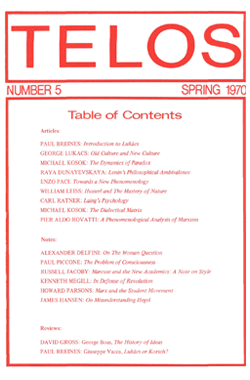As an occasional feature on TELOSscope, we highlight a past Telos article whose critical insights continue to illuminate our thinking and challenge our assumptions. Today, Yonathan Listik looks at Georg Lukács’s “The Old Culture and the New Culture” from Telos 5 (Spring 1970).

It would be simplistic to argue that behind the Marxist critiques of capitalist society there was only an objective intention simply to improve its effectiveness and avoid the political complications found in capitalist society. Despite its strict scientific tone, Marxism still carries a heavily moral intention. This is what Georg Lukács comes to argue in this essay on culture. In his analysis of capitalist cultural structure and its many differences from capitalist reality, Lukács points to what he regards as the ultimate goal behind communism: a new cultural order.
The idea that the Marxist struggles against capitalism involve not just an economic front but also a cultural and intellectual battle is certainly revolutionary. This notion is especially relevant considering some later developments in Marxist theory, such as those found in the work of the Frankfurt School and Paulo Freire’s critical education writings. The core idea is that capitalist productive order is alienating, but even the total removal of it would not magically provide emancipation from its social structures. On the contrary, the culture of capitalism must change.
The determinist notions present in Marx, namely, that the world functions as a machine and that by changing its central mechanisms it would be possible to completely change everything is gone. Instead Lukács places ideas that were considered superfluous to the system in the driver’s seat of capitalist social structuring. For Lukács, the issues present in capitalism not only result from its economic order but also involve culture and ideology: “The roots of the crisis of capitalist culture reach still deeper than this. The foundation of its perpetual crisis and internal collapse is the fact that ideology on the one hand and production and social order on the other enter into irreconcilable contradiction.”
Lukács’s point here is that overturning the capitalist productive and social order is just the means for achieving the real goal of communism, that is, a new social order. This is especially relevant to him when considering the reality of the Soviet Union. The emphasis is on the real aim in Marxism: emancipation, that is, a new moral order that will allow men real autonomy. The industrial production system of labor should respect men and have freedom as its final objective. In the end Lukács fights not against capitalist production order but against the capitalist ideology that allows this order, that permits an unjust and unfree economic logic to rule unchallenged as a natural force.
Nevertheless it is hard not to be disappointed by Lukács’s almost eschatological perspective. Like Marx, Lukács trusts that once the obstacle is removed, the new culture would rise on its own. If in orthodox Marxism it is just a changing of the wheel, for Lukács it is just a removing of the obstacle. Moreover, he refrains from actually describing this new culture in detail. Since he places himself as someone playing a part of the capitalist structure, Lukács therefore realizes he is unable to rethink culture freely.
Like many of his disciples, Lukács fails to provide a solution to these complex contradictions in capitalist culture. His criticism is precise, and he has a humanistic focus. Yet he neither presents a method for overturning capitalist structure, nor does he describe his communist alternative. We have to believe him that once society does overturn capitalism, communism will naturally take its place: “Sociological research must be limited, then, to analysis of the framework. What the culture of proletarian society will be—that is, what it will be substantively, how it will be essentially constituted—is exclusively determined by the powers of the proletarian as they become free.”
The problem is that here Lukács risks falling into the same messy contradictions found in the transitional strategies followed in the October revolution in Tsarist Russia. There all the political abuses of power were accepted cynically as part of the transition into a communist society. In turn, given full measures of patient suffering, a truly humane proletarian rule would arise. Lukács is evidently critical of this simplistic quietism, since he points to the necessity of also abolishing the abusive mentalities behind capitalism. Even so, as if he leaves his theory open to the natural development of history, it might also deviate in the next revolution from the morality of freedom so crucial for to him. In the end, he does not provide a convincing horizon of action.
Lukács without a doubt breaks with orthodox Marxism by placing as root cause what was only hitherto taken to be consequence. The cultural turn that Lukács advanced is central to future Marxists. Taking into consideration how the Soviet Union and its productive and social order evidently failed at fully abolishing capitalism and its culture, it is clear the Soviet leadership always prioritized economic goals over human autonomy. Here Lukács touches what is probably the heart of Marxism, namely, its deeply emancipatory character. Autonomy is the true objective behind Marxism. In a sense, Lukács is saying that Marxism without freedom is not Marxism, even after it eventually perhaps succeeds at overcoming capitalism.
Read the full version of Georg Lukács’s “The Old Culture and the New Culture” at the Telos Online website. If you are affiliated with an institution that is an online subscriber to Telos, you have free access to our complete online archive. If not, you can purchase 24-hour access to this and other Telos articles at a per-article rate. Follow the article link for more details.



